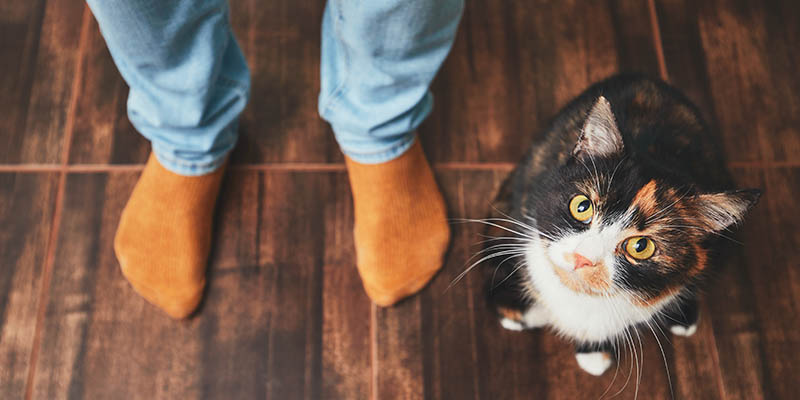The ideal house temperature for dogs and cats will vary based on which season, as well as your pet’s breed, health conditions and other circumstances. Let’s start with our general recommendations for summer and winter.
Ideal Summer Temperature for Pets
In general, you should set the thermostat between 75 and 78 degrees F when you’re at home in the summer. If you have a large, long-haired dog, such as a Husky or Samoyed, set the temperature around 75 for the dog’s comfort. Conversely, if you have a short-haired cat, set the thermostat around 78.
To keep energy costs low, when you’re gone at work all day or on vacation, adjust the temperature a bit higher, but no higher than 80 degrees to ensure your pet’s well-being and comfort. Also, provide fresh water and an area to cool off, such as the basement or a room with tiled flooring.
Ideal Winter Temperature for Pets
Set the thermostat between 69 and 72 degrees when you’re at home in the winter. Large animals with thick coats tend to prefer temperatures on the lower end of this spectrum, while you may want to set the thermostat higher for your hairless cat or new puppy.
When you’re away from home, set the thermostat no lower than 60 degrees. Keep the temperature higher for small, young, or sick animals. Always provide your pet with a soft, warm bed, and open the curtains so the sun shines in, giving the animal a place to sunbathe.
Dial in the Ideal Temperature for Your Pet
Now that you have summer and winter ranges, let’s discuss factors to dial in the ideal temperature for your specific pet’s needs.
Coat Type: Dogs and cats with thick, long coats tend to be more cold-tolerant. In fact, they often overheat faster than humans. On the other hand, pets with thin, short fur, or hairless pets, do not retain body heat as well and therefore prefer warmer temperatures.
Size: Smaller pets get cold more quickly than larger pets do. This occurs because they have a higher surface-area-to-volume ratio. This means they have more skin through which to lose body heat relative to their size than larger animals do.
Body Fat: Overweight pets have a thicker insulating layer to protect against the cold. However, the health risks associated with obesity greatly outweigh the added warmth in the winter, so strive to keep your pet lean and fit.
Age and Health: Puppies and kittens, as well as elderly pets, require warmer house temperatures. Animals with acute infections or chronic joint conditions benefit from higher temperatures and heated sleeping areas as well.
Ensure Furnace and Air Conditioner Reliability
Make sure your pets are not suffering at home without heat or AC by choosing Aire Serv for regular maintenance. Learn more about our heating maintenance and cooling maintenance programs to keep your systems running smoothly for healthy, comfortable pets.
